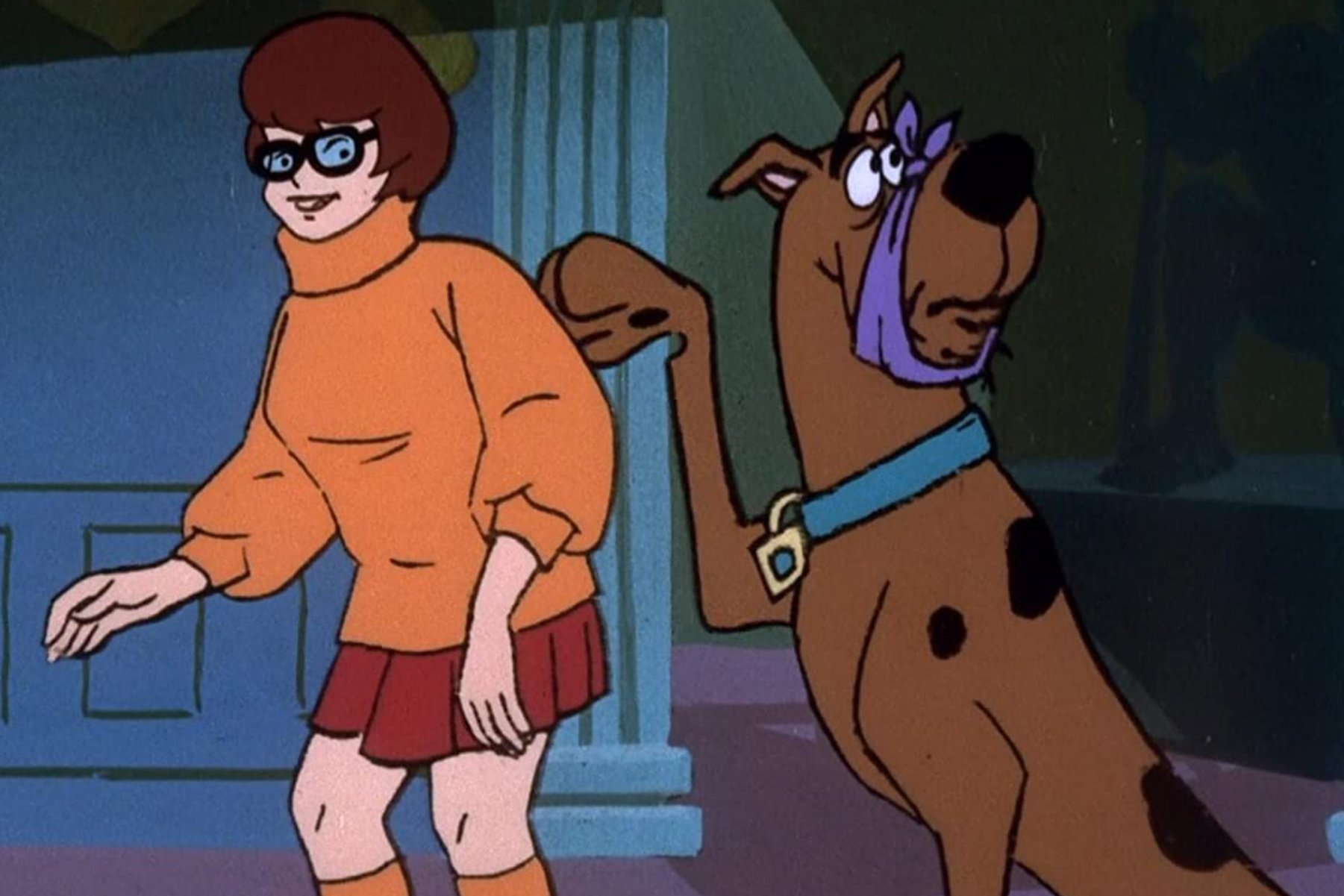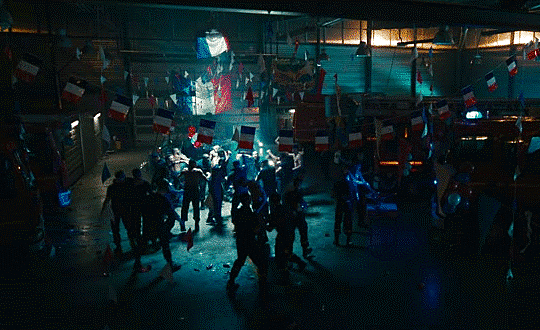Cucumber Salad #13: Special Halloween Edition 🥒
If there’s one thing you should know about me is that I love horror and I love Halloween! I’ve been intrigued about this genre since I was a child and through horror movies I learned how to understand many of my feelings, anxieties, and beliefs. Considering the importance of horror in my life I decided to make a special newsletter about this genre and my relationship with it through the years.

Velma: one of the characters that I related the most as a child.
Why did I approach horror in the first place?
I was raised by a helpless cinephile, my mother, who would always talk about her passion for Hitchcock. She and my aunt would tell me about my grandmother’s reaction after coming back from the cinema having watched Birds, and how the film was a topic of constant conversation around the house.
My mother would show me her favourite Hitchcock films and carefully describe her feelings while watching it, the thrill and curiosity that those films sparkled in her was very intriguing to me. Even though I was too young to actually understand the depth of those films I was interested in watching them until I was able to grasp all of the richness of emotions my mom talked to me about.

Growing up I was a very scared child, the anticipation of watching a horror film itself sometimes made me paralysed with fear. I had night terrors and deep and haunting feelings of anxiety, and a terrifying fear of vampires as well.
But at the same time that I was disturbed by those feelings of fear and anxiety, I was also intrigued, and I would carefully approach horror-coded works and try to slowly get comfortable with them, in order to know what it was about.
I remember being very interested in Tim Burton’s films, and his early works were my basis for starting to properly approach horror. I watched his early short films on Youtube, and started to study his aesthetic and patterns, which were the trademark of his works. When I finished my English course studies I remember giving a little presentation on his work, and carefully analysing aesthetic and narrative patterns. The thing is that I also held a personal connection to some of his characters like Lydia from Beetlejuice and Edward from Edward Scissorhands, because being a black mentally ill child kinda naturally makes you an isolated figure in life.

Don't have time to discuss the unmatched camp aesthetics that really stuck to me as well.
Teenagers getting lost in the gore
Something I felt kind of sad about is that when I was a teenager the horror movies on the mainstream media were mostly sadistic gore ones. I understand this genre has it’s value, but it’s just 100% not for me and I can’t get much from anything that’s just made for shock value.
Naturally, during my teenage years I would watch horror movies with my friends all the time, but I would rarely feel rewarded by the viewing experiences, I started to regard horror through this very limited window of a genre that would offer you a few jump scares and that was it.
Of course there were notable works that stuck with me like The Ring and The Grudge, that I truly believe are amazing works of those years, but still offered a very limited understanding of what the genre was.
But that didn’t mean that I lost my interest in horror, I think these disappointments had an opposite effect and I got even more invested in watching as many horror movies as I could in search of something that would stick to me. I think I felt a connection to the genre and I knew there was something in there for me.
I watched many trashy movies during this period, and while most were a waste of time, it was useful to learn about tropes and clichés of the genre, and of course there were the good trashy like Peter Jackson’s Braindead.
![[Film] Braindead, de Peter Jackson (1992) - Dark Side Reviews](https://external-content.duckduckgo.com/iu/?u=https%3A%2F%2Fwww.darksidereviews.com%2Fwp-content%2Fuploads%2F2021%2F04%2Fvlcsnap-2021-04-27-17h26m00s008.png&f=1&nofb=1&ipt=120a1ccc3f1ea2512110a8f5aebea1a4cb9693f6e84cd331b02c65cff34f36b3&ipo=images)
The thrill of gore
Slasher as a gateaway drug into horror
That’s when me and my neighbour and partner in crime Verônica started watching slasher films. Slasher films are super self-referential, so the more slashers you watch the more immersed in their little universe you’ll be, and that’s exactly what happened to us.
We quickly developed our own little culture around slasher films and were always excited about adding more movies to our catalogue. That’s how we were introduced to John Carpenter and more of Wes Craven’s works, which were exciting, thrilling, inspiring, and personally made me more inclined into watching movies that I would judge before as “too scary”, because I understood that the horror experience could be extremely inspiring (otherwise why would god give us Jamie Lee Curtis?)

Can't get much more iconic than this.

Tackling the universal anxiety about bathtubs.

Some things become prophetic: don't we all wish a hole of blood would open on Johnny Depp's mattress and swallow him to hell?
I think until the end of my adolescence I was already pretty excited about horror. I was even looking forward to the Evil Dead remake (which was good but the forest rape scene was too visceral for me). But I think that I still lacked a broader understanding of what horror was as a genre, maybe because it had been historically boycotted from the prestigious mainstream, with little works making it into recognition like Silence of the Lambs and The Shinning.
I remember still understanding horror as a minor genre, something that didn’t have as much value as drama, for example (which is crazy considering that growing up movies like Crash were winning best picture, moments from cinematic history we all wish could be erased forever). But then Robert Eggers came and everything changed.
The Witch and the Horror Renaissance
In 2015 the film The Witch was horribly mis-advertised as a standard horror film, I went to the cinema waiting for jump scares (back then I was bored to death with the Paranormal Activity epidemic and was craving something NEW), instead I encountered something completely different. I remember leaving the theatre very confused, and actually it took me a few years to actually understand what I had seen. The thing is that The Witch touched on an extremely interesting perspective of horror that required an empathy from the viewer that most movies don’t.

The peak-a-boo of the century
Even thought I was confused by The Witch I was still very inspired by it, and that’s when I decided to start watching some other horror films that could offer me a more challenging perspective of the genre.
And I could name films that I watched during this phase forever. I dived into David Lynch’s work, giallo, Eastern Asian films, Polanski, revisited Hitchcock, Vincent Price, German expressionism… and I was finally able to fully consciously understand what was in horror for me.
I believe horror is the most innovative genre in cinema. It’s where concepts are born and where they go to die. If a movie is too subversive, or experimental it’s invariably going to be categorised as horror. If it’s a social commentary that’s too visceral or too cruel to be faced (Like Saló, Possession or Begotten) it’s going to be categorised as horror.


David Lynch and Bergman said: be gay
Horror explores cinematic techniques in order to tackle feelings we struggle to understand, name, or to be with for a long time. Through horror I was able to look at many of my anxieties from a spectator perspective and understand them better.
Since The Witch, I believe horror has been through a Renaissance era. Many directors have appropriated the genre to make fascinating commentary and homages like Ari Aster, Patrick Strickland and Brandon Cronenberg. I truly believe that the last decade in horror has been fulfilling the potential of the genre, with films that are carefully and thoughtfully crafted and are able to provide unique viewing experiences.

Where THE FUCK is Toni Collette's Academy Award for this performance? Is there any justice in this world?
What I want to say with this essay is that I’m passionate about horror, I love to watch a horror film and imagine that a crew of dozens of people were gathered to create that vision, that they believed on that idea and on that way of presenting a message.
Daily reminder that Titane wasn't nominated for best foreign film.
And that’s not to say that there aren’t powerful films that aren’t horror. Sci-fi for example is another very prolific and innovative genre, but horror still has dibs on cinematic innovation. I believe horror is very powerful, for it’s potential to talk to the outcasts, the weirdos, the queers and discuss their anxieties, give shape to their unspoken fears.

Ridley Scott really did that... what can we say...
Of course there are still dozens of commercial horror films released every year that don’t make any justice to the genre and are just committed to mindlessly repeating tired tropes (Netflix, I’m looking at you), but I honestly believe that horror is home to some of the best and most thoughtful commentaries about interesting aspects of life.
Processing emotional trauma through horror
I’m personally very attached to this genre because it has helped me understand so much about myself. How else would I have been able to give properly articulate my irrational fear of being secretly observed if it wasn't for Rosemary's baby?

Spiraling into insanity but well dressed, the unmatched quality of the costume design in Rosemary's Baby.

Cabin fever during the pandemic was made 100% more comprehensible after watching The Tenant.
Over the years I was able to deal with a lot of the emotional trauma I've been through by watching horror movies giving visceral shape to those feelings that had haunted me. Some films that deal with showing the violence of trauma can really offer a healing cathartic experience.

In Possession it's no coincidence this character is also called Ana, I'll tell you that (also, yes, this is a Isabelle Adjani stan account etc).
Horror films have the power of exposing the complexity of human relationships and how hard, and ultimately aggressive, it can be to psychologically work them out. In Bodies Bodies Bodies one of the characters exposes this complexity by telling their friend “I only hang out with you because of pity and the weight of our shared history”.

100% would have gone down the exact same situation if trapped in a house with some of the people I was friends with as a teenager.
I'm not saying that other genres can't address emotional trauma in their own ways, but I believe horror is able to create metaphors that expose the impact and magnitude of the violence, disorientation, anger, and despair that these experiences can carry.
That being said...
Here's a carefully curated list of some of my favourite horror films listed as double features for you to watch this month, you're welcome.
The Craft (1966)
Suspiria (2018)
The Love Witch (2016)
Suspiria (1977)
Mulholland Drive (2001)
Persona (1966)
Rosemary's Baby (1968)
Hereditary (2018)
In Fabric (2018)
Inferno (1980)
With love, 🕸🕷
Ana Luisa
